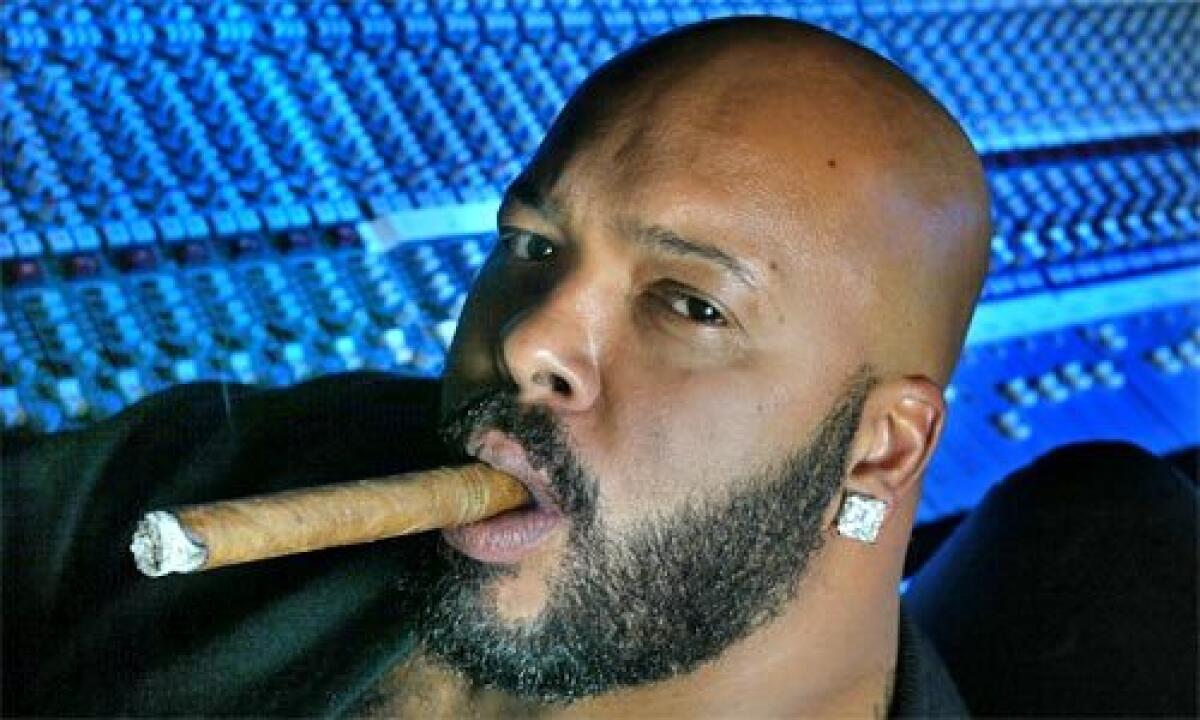Rap mogul denied bail, sent back to jail

Eager to get out of jail to produce albums for the holiday buying season, Death Row Records founder Marion “Suge” Knight was instead sent back behind bars Thursday by a judge concerned that Knight might be a danger to others.
Superior Court Judge J. Stephen Czuleger denied Knight’s bid for bail after prosecutors detailed Knight’s eight convictions--one under an alias--and after the defense produced the videotape of a fight involving Knight and others Sept. 7 at Las Vegas’ MGM Grand Hotel.
Defense attorneys sought to lessen the impact of the tape, a hotel surveillance video first mentioned in a probation report filed Monday. They argued that Knight, who was placed on five years probation last year for a 1992 assault in a Hollywood recording studio, was trying to play the role of peacemaker in the scuffle--an assault by several men on a Lakewood man with reputed gang ties.
But after watching the tape several times, Czuleger said it looked like Knight delivered at least two kicks. “Looks like he’s getting a last lick in, that’s what it looks like to me,” the judge said.
Knight, 31, who founded Death Row in 1992 and built it into the nation’s top rap label, has been in jail since Oct. 22 for possible probation violations.
The most serious allegation, Czuleger said, involves the videotaped attack on Orlando Anderson, 22, because it was an assault and Knight is on probation for assault.
Rapper Tupac Shakur is among those shown on the video; he was shot a few hours later while a passenger in a car driven by Knight. Shakur died a few days later at a hospital. The video, which was played in court for the judge and lawyers but not the media or public, purportedly shows Shakur, Knight and others pummeling Anderson. Las Vegas police say Anderson is not a suspect in Shakur’s slaying.
Czuleger is due to hold a hearing, rescheduled for next Thursday, on the extent of Knight’s involvement in the fight as well as other possible probation violations--among them, the allegation that Knight smoked marijuana. Knight faces up to nine years in state prison.
Knight’s chief defense attorney, David Kenner, said after Thursday’s hearing that he is confident the rap mogul will be released from custody next week, after “all the facts come to the forefront.”
Prior to the hearing, Knight was portrayed Wednesday night on ABC-TV’s “Prime Time Live” as the “most dangerous man” in the music business.
Knight, who was interviewed in his jailhouse blues, denied allegations that he had built his rap empire through intimidation and violence. When asked whether he would pass information on Shakur’s killer to police if he knew who it was, he replied, “Absolutely,” and then paused for effect before saying, “not.”
Even before Shakur was shot, Death Row had fallen behind in meeting deadlines to deliver five albums scheduled to be released for the lucrative holiday season. Failure to deliver the material could cost Death Row millions of dollars in advances.
Knight, who is intimately involved in overseeing production and mastering of all Death Row albums, was able to complete two albums before he was sent to jail two weeks ago.
The first, Shakur’s posthumous album “Makaveli: The Don Killuminati: the 7 Day Theory,” was released Tuesday and is expected to enter the nation’s pop chart next week at No. 1. Snoop Doggy Dogg’s “Tha Doggfather,” will be released Tuesday.
Other albums that have yet to be finished are singer Nate Dogg’s “G-Funk Classics, Volume I” and two compilations titled “Christmas on Death Row” and “Death Row’s Greatest Hits.”
In urging Czuleger to release Knight on bail pending Thursday’s hearing, Marcia Morrissey, another of the mogul’s five defense lawyers, said that because Knight has been behind bars, “production is in some danger.”
Deputy Dist. Atty. William Hodgman responded by detailing Knight’s lengthy rap sheet in open court for the first time, calling it a “history replete with assaultive behavior, violence and weapons.”
According to Hodgman, Knight was convicted in 1987 in Las Vegas of battery; in 1990 in Beverly Hills and Hollywood of separate batteries and in Van Nuys of disturbing the peace; in 1991 in West Covina of carrying a concealed weapon, and in 1992 in Las Vegas of assault with a deadly weapon.
In the 1991 case, Hodgman said, Knight used the name Richard Chapman and received two years probation. Hodgman said authorities apparently were unaware at the time that Knight was under two years probation in both the Hollywood and Beverly Hills cases.
In January 1995, Hodgman added, Knight pleaded guilty in federal court in Las Vegas to a weapons violation and was placed on three years probation.
The next month, on Feb. 9, 1995, Knight pleaded no contest to two counts of assault stemming from the 1992 attack on two would-be rappers in a Hollywood studio. Judge John Ouderkirk imposed a suspended nine-year prison sentence and five years probation.
Before denying bail, Czuleger said of Knight’s repeated trips to court: “He’s had every reason to believe things would work out. He’s been given a lot of breaks.”
The judge added a moment later: “No one’s said, ‘Enough’s enough. That’s it.’ ”
More to Read
Start your day right
Sign up for Essential California for news, features and recommendations from the L.A. Times and beyond in your inbox six days a week.
You may occasionally receive promotional content from the Los Angeles Times.






